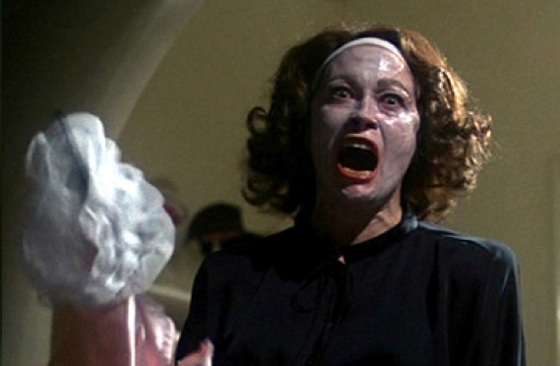A point my mother made regarding some of what I’ve written about the past: “I remember differently than you on most entries. Not because I am blind but because children are little and see things big.”
Mood music:
I don’t disagree with that. When you’re little you do see things big.
In this case, my mother was referring to the stuff I’ve written about my childhood and whether things really happened as I remember it. “I love you but cannot understand how you can go online and write these awful Mommy Dearest entries,” she wrote to me (full comment — and my response — at the bottom of this post).
For those who aren’t aware, “Mommie Dearest” is a memoir written by Christina Crawford, the adopted daughter of actress Joan Crawford. The book, which depicts Christina’s childhood and her relationship with her mother, was published in 1978 and released as a movie in the early 1980s.
Christina’s version of her childhood is brutal. By her account, her mother beat her with a wire hanger, made her scrub the bathroom floor in the middle of the night and cut her son and daughter from her will.
As kids we joked about the movie and often suggested our mom was “Mommie Dearest.” To this day, truth be told, the scene in the movie where Joan freaks out about the wire hanger sends me into a fit of laughter.
My mother always hated when we made the comparisons, which is understandable. The thing is, I don’t really remember her as a “Mommie Dearest.” Not even close. Ugly things did happen back then, but we suffered as a family. My mother reacted back then in ways that didn’t make sense to me, but I don’t see her as the symbol of a bad childhood. Not for one second. Her love for us kids was unmistakable, even when she struggled to cling to sanity in our presence.
Why do I write about it here, for all to see? There are several reasons.
To understand my adulthood with OCD and addictive behavior, it’s important to see how I got that way. History plays an important role in how our adult demons manifest themselves. If I don’t share this stuff, the reader won’t connect with all the points I make about how I was able to overcome a lot of demons. To that statement some will cry bullshit. That’s fine by me. The memories must be shared because that’s how the reader is able to relate what I tell them to their own experiences.
Those who have written me about how this blog has helped them gain perspective about their own lives and allowed them to start dealing with their problems always point to the back story. They relate to it first, and then they are able to put my end points into perspective. Without the raw recollections to chew on, you can’t start building a foundation of strong recovery.
Also, since this blog is part memoir, the author’s recollections will inevitably leave some people stung and pissed off.
This exchange with my mom has been useful in that it makes me look at my own behavior as a parent.
I’d love to tell you that I learned from my parents’ mistakes and have been a better dad as a result, but is that really how my kids see it?
After all, as my mother noted, when you’re little you see things big.
When they’re in their 40s, will they remember my smaller quirks as explosive outbursts that cut them to the core?
I guess I’ll find out in a few years.
But for now, it gives me extra incentive to conduct myself in a way that they will look back on with respect and happiness.
If I succeed, everything I went through will have been worth it.


Good one!